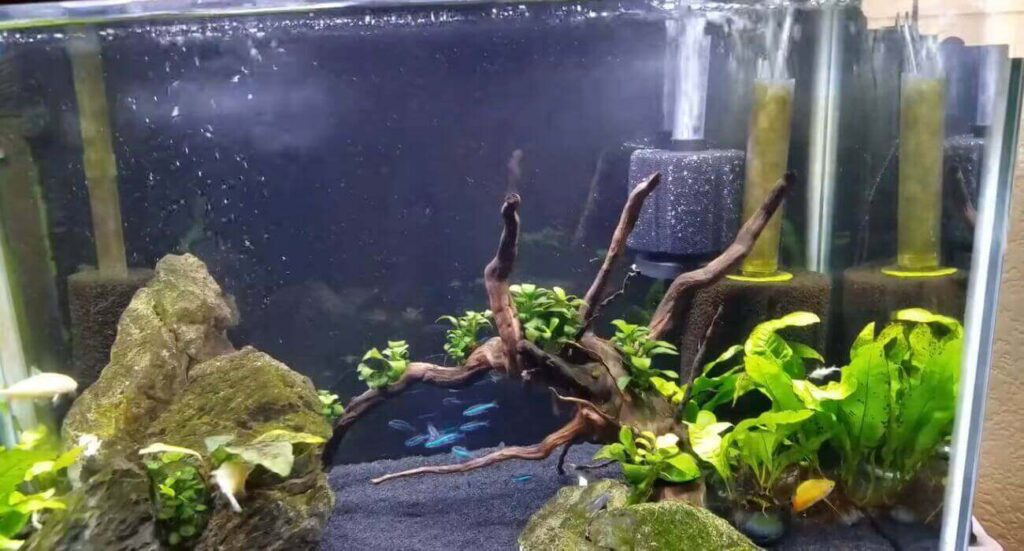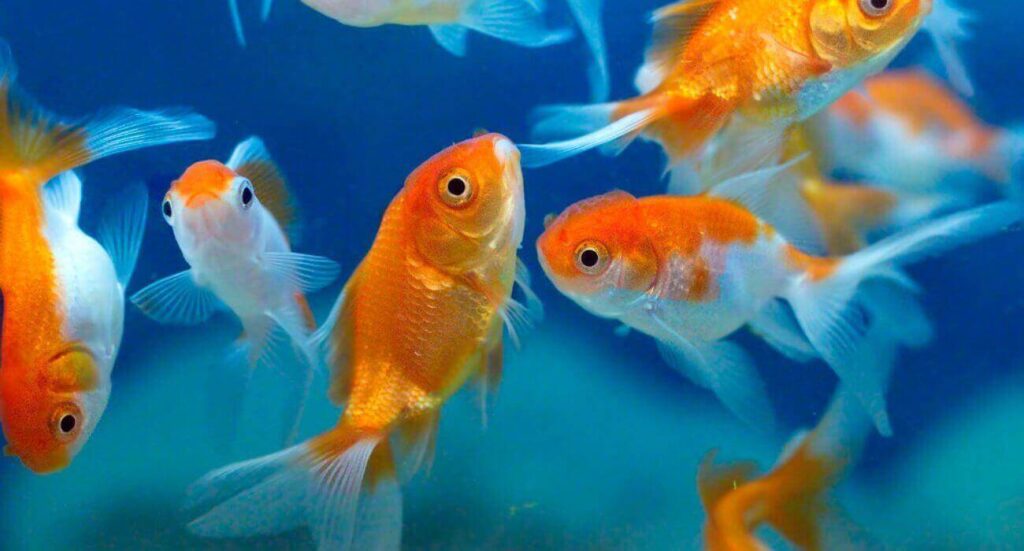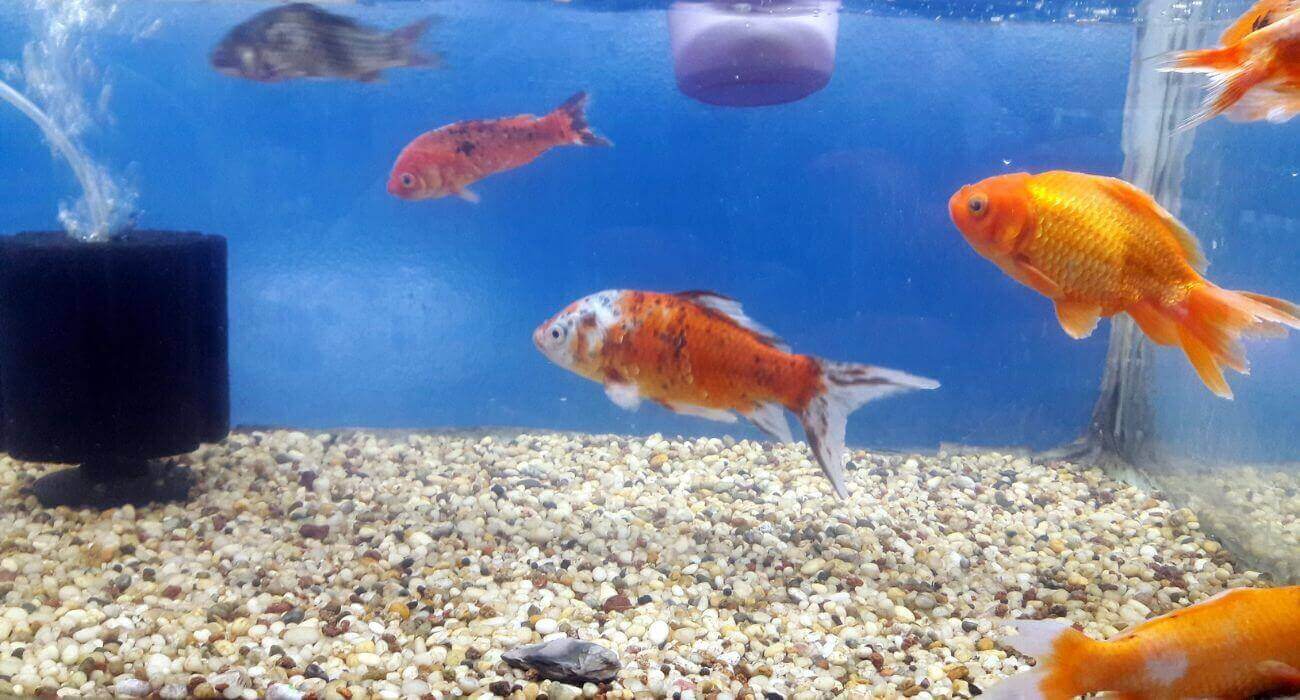As an Amazon Associate, I earn from qualifying purchases
Most fish need a constant supply of oxygen to survive, and without an air pump or filter, the oxygen in the water can become depleted, making it difficult for them to breathe. This can lead to stress, disease, and death.
The Importance Of Air Pump And Filter In An Aquarium

Fish need a constant supply of oxygen to survive, making an air pump and filter crucial in an aquarium. Without them, the oxygen levels in the water can decrease, leading to stress, disease, and ultimately death for the fish.
Understanding The Role Of Air Pump
Fish, like any other living creatures, require oxygen to survive. In an aquarium, an air pump plays a crucial role in providing the necessary oxygen supply for the fish. The primary function of an air pump is to promote water circulation and increase oxygen levels in the tank. By creating bubbles and agitation at the water’s surface, an air pump enhances the gas exchange process, allowing oxygen to dissolve into the water and release harmful gases, such as carbon dioxide. This helps maintain a healthy and oxygen-rich environment for the fish.
An air pump also aids in breaking the water’s surface tension, preventing the formation of a stagnant layer that can hinder oxygen diffusion. Moreover, the gentle movement of the water created by the air pump mimics natural currents, which can benefit certain fish species that thrive in flowing waters. Additionally, the bubbling effect created by the air pump can add visual appeal to the aquarium, creating a soothing and aesthetically pleasing display.
Understanding The Role Of Filter
In an aquarium, a filter is an indispensable component for maintaining water quality and ensuring the well-being of fish. The filter serves several important functions that contribute to the overall health of the aquatic environment.
Firstly, a filter eliminates physical impurities, such as uneaten food, fish waste, and decaying plant matter, from the water. These particles, if left unfiltered, can degrade water quality and contribute to the accumulation of harmful toxins. The filter’s mechanical filtration system traps and removes these unwanted substances, preventing them from polluting the water.
Secondly, a filter facilitates biological filtration, which is vital for the nitrogen cycle in an aquarium. Beneficial bacteria colonize the filter media, converting harmful ammonia, released from fish waste, into less toxic substances like nitrites and nitrates. These bacteria break down organic matter, ensuring a continuous and natural purification process that helps maintain a stable and healthy environment for the fish.
Lastly, a filter provides aeration by agitating the water’s surface. This action enhances oxygen exchange and prevents the formation of stagnant areas, where gases and toxins may accumulate. By constantly circulating the water, a filter helps oxygenate the tank and removes carbon dioxide, ensuring the fish have a sufficient oxygen supply.
In summary, the air pump and filter are essential components of an aquarium. The air pump aids in oxygenation, water circulation, and provides aesthetic benefits, while the filter removes physical impurities, promotes the nitrogen cycle, and maintains a healthy aquatic environment. Both play critical roles in ensuring the well-being and longevity of fish in a tank.
How Long Can Fish Live Without Air Pump Or Filter?

Most fish need a constant supply of oxygen to survive. Without an air pump or filter, the oxygen in the water can become depleted, leading to stress, disease, and death for the fish.
an quickly deplete, leaving the fish struggling to breathe. However, the length of time that fish can live without an air pump or filter depends on various factors such as the fish species, water temperature, water quality, and tank size. In this blog post, we will explore the answers to some commonly asked questions about how long fish can survive without an air pump or filter.
Can Fish Survive Without Air Pump For A Day?
While some fish species have a higher tolerance for low oxygen levels, most fish cannot survive without an air pump for an extended period. As a general rule, it is not recommended to leave your fish without an air pump for more than 24 hours. Without adequate oxygen circulation, the fish may become stressed, lethargic, and even suffocate.
How Long Can Fish Live Without An Air Pump?
The survivability of fish without an air pump largely depends on the factors mentioned earlier. Some species, like betta fish, have a labyrinth organ that allows them to breathe in oxygen from the air. These types of fish can survive for a short period without an air pump, although it is still crucial to ensure they have access to fresh air. On the other hand, fish that rely solely on dissolved oxygen in the water may only survive a few hours without an air pump before oxygen levels become critically low.
What To Do When Air Pump Remains Unavailable For A Few Days?
If you find yourself in a situation where the air pump for your fish tank is unavailable for a few days, there are a few steps you can take to mitigate the lack of oxygen circulation. Here’s what you can do:
1. Increase surface agitation: One way to improve oxygen levels in the water is by increasing surface agitation. You can achieve this by creating a gentle flow using a water pump, turning on the filter (if available), or even using a simple DIY method like creating a small waterfall effect.
2. Reduce fish population: If you have a heavily stocked tank, consider temporarily rehoming some of the fish to reduce the oxygen demand. Fewer fish in the tank means less oxygen consumption, giving the remaining fish a better chance of survival.
3. Limit feeding: Overfeeding can lead to an increase in organic waste, which in turn consumes oxygen during decomposition. By reducing the amount of food you give to your fish during this period, you can help maintain better water quality and conserve oxygen.
What To Do When Filter Remains Unavailable For A Few Days?
Similar to the air pump scenario, if your filter is unavailable for a few days, you can take certain steps to maintain a healthy environment for your fish. Here are some suggestions:
1. Perform regular water changes: Without a filter, it’s important to compensate for the lack of mechanical and biological filtration by conducting frequent water changes. Replace a portion of the tank water every day to remove accumulated waste and toxins.
2. Clean the tank: While you may not have a functioning filter, you can manually remove debris and uneaten food from the tank. Use a siphon or net to skim the surface and bottom of the tank, keeping it as clean as possible until the filter becomes available again.
3. Monitor water parameters: Regularly test the water parameters, such as ammonia, nitrite, and nitrate levels, to ensure they remain within acceptable ranges. If necessary, take appropriate measures to correct any imbalances that may arise due to the lack of filtration.
How To Handle Vacations Without Air Pump Or Filter?
When going on a vacation, it can be stressful to leave your fish tank unattended without an air pump or filter. However, with some careful planning, you can ensure your fish’s survival during your absence. Here’s what you can do:
1. Invest in an automatic feeder: An automatic fish feeder can dispense controlled portions of food at scheduled times, preventing overfeeding and maintaining water quality.
2. Consider a battery-powered air pump: In situations where you anticipate a power outage or extended period without electricity, having a battery-powered air pump can provide essential oxygen circulation for your fish.
3. Request assistance: If possible, ask a trusted friend or family member to check on your fish tank while you’re away. They can perform necessary water changes, clean the tank, and ensure the well-being of your fish.
Managing Power Outages Without Air Pump Or Filter
Power outages can pose a significant risk to fish tanks, especially if they result in a lack of air circulation and filtration. To mitigate the impact of a power outage, you can follow these steps:
1. Minimize opening the tank: Limiting the frequency of opening the tank lid can help retain heat and reduce the loss of oxygen. Only open the tank when necessary, such as for feeding or emergency situations.
2. Cover the tank: Place a blanket or towels over the tank to trap heat and keep the water temperature as stable as possible. Lower temperatures can slow down the fish’s metabolism and increase their tolerance to lower oxygen levels.
3. Use a battery-powered air pump: Having a battery-powered air pump on hand can prove invaluable during a power outage. Connect it to an airstone or air stone ornament to ensure continuous oxygenation of the water.
In conclusion, while fish can survive for a short time without an air pump or filter, it is crucial to provide them with adequate oxygen and maintain water quality to ensure their well-being. By taking the necessary precautions and implementing temporary solutions, you can help your fish sustain themselves until the air pump or filter becomes available again.
Frequently Asked Questions For How Long Can Fish Live Without Air Pump Or Filter
Can Fish Survive Without A Pump And Filter?
Most fish need a constant supply of oxygen to survive, so they cannot survive without a pump and filter. The oxygen in the water can become depleted, making it difficult or even impossible for the fish to breathe, leading to stress, disease, and death.
How Long Can Fish Survive In A Tank Without A Pump?
Fish can survive in a tank without a pump for a short period, but it can lead to oxygen depletion and make it difficult for them to breathe. This can cause stress, disease, and even death. It’s important to ensure a constant supply of oxygen for their survival.
How Long Can Fish Survive In Tap Water?
Fish can survive in tap water for a short time, typically a few hours, depending on factors like fish species, water temperature, and oxygen levels. However, it is important to treat tap water before adding it to the aquarium to ensure the longevity and well-being of the fish.
How Long Can Fish Filter Be Off?
Fish can survive without a filter for a short time, but it’s not recommended. Most fish need a constant supply of oxygen, and without a filter, the water can become depleted, leading to stress, disease, and even death. It’s best to keep the filter running at all times.
Conclusion
Fish need a constant supply of oxygen to survive. Without an air pump or filter, the oxygen in the water can become depleted, leading to stress, disease, and ultimately death. It is important to ensure proper aeration in the tank to maintain the well-being of your fish.
Remember, each fish species has different oxygen requirements, so it’s essential to do your research and provide the necessary equipment for their survival.
Read More
How to Get Air Out of Pool Pump: Quick & Foolproof Guide
How to Get Air Out of Sand Filter Pump: Quick Fix Tips
As an Amazon Associate, I earn from qualifying purchases

